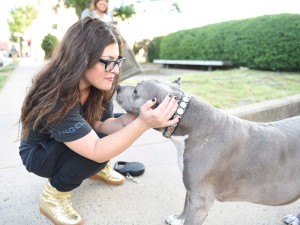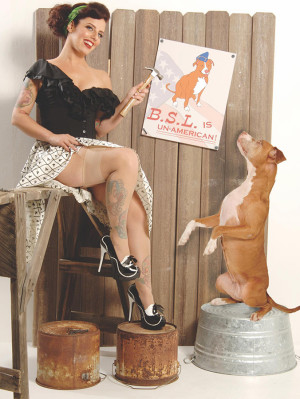News Outlets Recklessly Give Pit Bulls a Bad Rap—Yet Again
Following the death of a California man last week, headlines only did further harm to Pit Bulls’ reputation.

Share Article
Today in “WTF are we doing here,” there’s yet another example of Pit Bulls being misrepresented by mediaopens in new tab as innately aggressive dogs to catastrophic effect. In 2024, this type of malicious ignorance is unfortunately not surprising, but it’s disappointing nonetheless.
Last week, a 35-year-old man was killed in an animal attack. According to reportsopens in new tab, the Compton, California resident had 13 dogs confined to kennels in his backyard as part of what reports are saying opens in new tab may have been a backyard breeding and dog-fight training operation.
Reportedly, sometime between 7 p.m. and 8 p.m. Thursday, while feeding the dogs, the man was caught in an altercation between them before succumbing to subsequent injuries. Per CBSopens in new tab, the dogs are now in possession of county animal control officials, who “will determine if any will need to be euthanized.”
To be clear, a man’s tragic death should not be minimized. But what multiple media outlets are choosing to highlight and ignore in their coverage of this event is absolutely deserving of major scrutiny. It reflects a long-gestating trend of Pit Bulls being falsely represented.

This is the headline from local news station KTLAopens in new tab: “Pit Bulls in Compton maul breeder to death.” Then Los Angeles Magazine tried to one-up opens in new tab KTLA’s clickbait nonsense with “Compton Man Mauled to Death by Pack of Pit Bulls He Was Breeding.” Are you sensing a trend yet? TMZ even offered opens in new tab this hot-off-the-presses steaming pile of BS: “Pit Bulls Attack: Pack Mauls Man to Death... Bloody Body Left in Kennel.” Framing matters, especially for dogs who have historically suffered from widespread misunderstanding. It’s why seeing major outlets like these continue to churn out misleading and harmful rhetoric is so frustrating.
Irresponsible media coverage of Pit Bulls is dangerous.
If this all sounds overly dramatic or sensitive, I get it. These websites are running with the reported information that a man was ultimately killed by his dogs, and they’re simply reporting it to the public. Except there are some colossal details and caveats that are being ignored in hopes of increased digital traction. Here’s a question for these outlets: Do you know what purebred Pit Bulls, Hogwarts, and the blue people from Avatar all have in common? None of them exist in our reality.
Pit Bulls are not a dog breed. Instead, they’re a breed type made up of several varying dog breeds with a widespread genetic background. American Staffordshire Terriers, Staffordshire Bull Terriers, American Bulldogs, and American Bullies all fall under the Pit Bull umbrella, meaning any given Pittie’s personality, demeanor, or appearance can differ significantly.
But what tends to happen when law enforcement or journalists respond to dog bite incidents is they misclassify animals barring any resemblance to these breeds are Pit Bulls due to lingering prejudices, subconscious biases, or blatant laziness. In fact, a 2017 study found opens in new tab that 60 percent of the time dogs in shelters are misidentified as Pit Bulls. And this was only by shelter workers who generally have the animal’s best interest at heart. Imagine what that number would be for the cops making snap judgments on the scene or wanting to speed up their paperwork.
So, when People slaps “California Man Found Dead in Backyard Kennel After Being Attacked by His Own Pit Bulls” on their websiteopens in new tab, it furthers a bigoted narrative. If an average person unaware of the 30-plus year tradition of misrepresenting Pit Bull-type dogs sees a headline like this, they may start to associate the breed type with violence and aggression. And the cycle continues.
Remember: No dog is inherently violent.
The ASPCA has even released a statementopens in new tab on Pit Bulls in an attempt to clear up these misconceptions in which the organization confirms violence is a taught trait. “While a dog’s genetics may predispose it to behave in certain ways, genetics do not exist in a vacuum. Rather, behavior develops through a complex interaction between environment and genetics,” it reads.
Put simply: No dog is inherently hardwired for aggression or violence. Their personalities are largely the result of their surroundings and how they are treated. Something you surely won’t see represented in these recent headlines is the conditions that these dogs were living in.
There’s no way to sugarcoat it: If these dogs were part of a backyard breeding practice as reported evidence suggests, they were never given a chance at a loving home or even basic human decency. Not to mention, only five of them are adults; the other eight are considered puppies.
Coverage like this leads to unjust legal actions.
There are also less immediate consequences from incidents like these and how the media presents them. Because of the prejudice these events create, lawmakers put forth breed-specific legislationopens in new tab, which prohibits Pitties from certain apartment buildings and public spaces. This limits families’ abilities to rent, buy homes, or purchase insurance.
Overseas in the U.K., the XL Bully Breed, a Pit Bull-type dog, was recently outlawedopens in new tab as a direct result of shoddy reporting like this. This week, a similar ruling in Scotlandopens in new tab goes into effect as all XL Bullies will now need to be muzzled at all times when in public, including while in their own car.
None of this is to say an incident like what recently happened in Compton shouldn’t be reported on. But the type of dogs involved should not be the focus of the story, as it’s entirely irrelevant. Other missing details, such as the dogs’ environment and treatment, should have been more in the spotlight. Allow me to put this in Netflix true-crime terms: If after police found the one person who escaped Jeffery Dahmer’s captivity, the headlines read, “Man Flees Apartment of Photography Enthusiast,” I think they’d be missing some crucial information.
References:
Inconsistent Identification of Pit Bull-Type dogs By Shelter Staffopens in new tab

Sean Zucker
Sean Zucker is a writer whose work has been featured in Points In Case, The Daily Drunk, Posty, and WellWell. He has an adopted Pit Bull named Banshee whose work has been featured on the kitchen floor and whose behavioral issues rival his own.
Related articles
![A woman walking 5 dogs on leashes outside.]()
Breed Does Not Equal Behavior—Here’s Why
A new study found that a dog’s breed accounts for less than 10 percent of their behavior.
![2 cute pit bull dogs laying next to each other on a blanket]()
BSL is Just Plain BS
Breed-specific legislation has profound impacts on families, their dogs, and animal welfare professionals.
![Happy lesbian couple cuddling on the couch with pet dog]()
Guess Which Shelter Dogs Make Great Service Dogs
Loyal, devoted, and dutiful, Pit Bulls are proving to be pretty well suited to helping humans in need.
![Rebecca Corry with her dog]()
Comedian Rebecca Corry Stands Up for Pit Bulls
“Comedy and entertainment — that’s my passion. But my purpose in life is saving dogs. And somehow I have managed to combine the two.”
![Man hugging brown Pit Bull dog.]()
The XL Bully Breed Ban in the UK Will Officially Take Effect December 31
Parents of these dogs will have until the end of January 2024 to register them.
![Deirdre Franklin dressed as a pinup model holding one of her calendars while sitting on a wooden table next to a Pitbull dog sitting on its hind legs looking up at her]()
Pinups for Pitbulls Rolls Up the Victory Curls For the Pups Who Need It Most
Back in the day, pinup models donned their victory rolls to boost wartime spirits. Now, they do it to advocate for a much-maligned dog breed. Deirdre Franklin, the founder of Pinups for Pitbulls, explains how a burlesque hobby evolved into a life-saving non-profit.
![Asha Leo walks with her psychiatric service dog, Pirate, on a trail]()
Pirate the Pit Bull Is Asha Leo’s “Person”
How the Pit Bull advocate is bolstered by her Instagram-famous psychiatric support dog.









